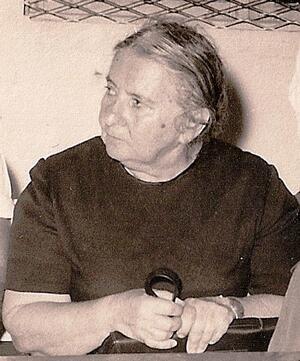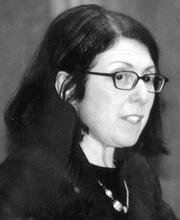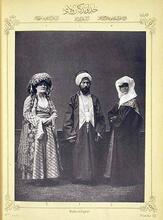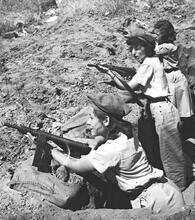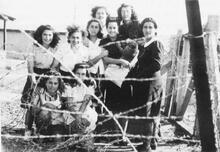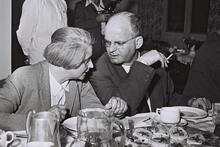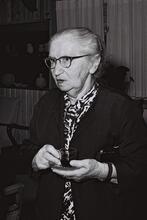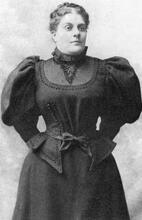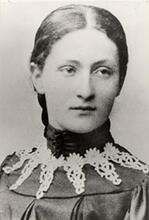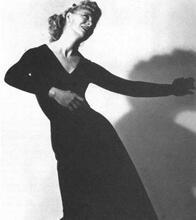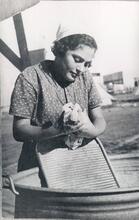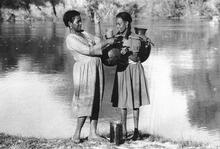Rivka Guber
Celebrated educator and volunteer Rivka Guber in 1968. Image courtesy of the Ezra Morad Archive via Wikimedia Commons.
Rivka Guber emigrated to Palestine from Ukraine with her husband in 1925. She served in the British Army’s Auxiliary Territorial Service from 1940 to 1942. Her two sons followed her into the military and both died in the 1948 War of Independence; their short lives inspired Guber’s first book. In the 1950s she helped establish a village for recent immigrants and taught at a school for immigrant children. Her second book called attention to the struggles immigrants faced. After she was awarded the Israel Prize in 1967 for her work in education and immigrant absorption, she began recording her neighbors’ experiences in the Holocaust, publishing them in 1974. Guber continued to write and volunteer until the end of her life.
Early Life and Family
Rivka Guber (née Bumaghina) was born in 1902 Novo-Vitebsk in Ukraine and went to high school in Yekaterinoslav (Dnipropetrovsk), intending to continue her studies at university. The outbreak of the revolution disrupted her plans and forced her to return to Novo-Vitebsk, where she worked as a teacher. In 1920 she married Mordecai Guber, who was born in 1893 in the town of Gorodik near Bialystok. They immigrated to Palestine in 1925. The couple settled in Rehovot, where Mordecai taught Hebrew. They were among the founders of Kefar Bilu (1933), later leaving to join Kefar Warburg, where they raised their two gifted sons, Ephraim (1927-1948) and Zvi (1931-1948).
Guber was known for her readiness to volunteer her services to any cause that would serve the nation. During World War II, as a 40-year-old mother of three (her daughter Haya [b. 1938] was a young girl at the time), Guber volunteered for the ATS (Auxiliary Territorial Service) of the British Army, where she served from 1940–1942 along with other Jewish women soldiers.
Guber imparted to her sons her own values of volunteerism, loyalty, and dedication to their people. Ephraim enlisted in the British Army and fought against the Germans; with the outbreak of the War of Independence, he joined the ranks of local Jewish fighters and fell in battle on March 26, 1948, two months before the state was declared. His younger brother, Zvi, a gifted poet, enlisted in the army at an early age. He too fell in battle on July 8, 1948. In her book Im ha-Banim (With my sons), Guber offered a portrait of her sons and shared various aspects of her life and family. She bore her grief bravely and came to be known as “Em ha-Banim” (mother of the sons).
Supporting the New Jewish State
The establishment of the state saw the onset of a massive wave of immigration that doubled the population of Israel within a short time (1948–1951). Rivka and Mordecai Guber went to the aid of new immigrants living in the transit camp at Qastina. After several years of intensive activity absorbing immigrants in the area, they volunteered in 1955 to move to Hevel Lachish, a region being developed at the time by a group of planners headed by Arieh (Lova) Eliav. The Gubers donated their farm at Kefar Warburg to the state’s Defense Fund and went to live at Nogah, one of the first Lit. "village." The dominant pioneer settlement type of the Jews in Palestine between 1882moshavim established in the Lachish region, where they were involved in immigrant absorption. Rivka set up classes for the children of the moshav, while Mordecai guided them through their first steps in their new home. The couple later moved to Nehorah, the village center of Hevel Lachish, which was established to provide the surrounding settlements with health, educational and cultural services and trades. Here Rivka established a school for the children of new immigrants from nearby settlements and served as its principal. She later also set up a library for the immigrants and their children. Mordecai established the regional council of Lachish, which he headed.
In her book El Masu’ot Lachish (Signal fires of Lachish, 1961), Guber described the challenges and difficulties confronting the couple in their work with the immigrants of Lachish and the many achievements of the settlement enterprise there. David Ben-Gurion, then Prime Minister and Minister of Defense, considered Rivka Guber to be a role model and a symbol of volunteerism and devotion to the state. Guber was awarded the Israel Prize in 1967 for her life’s work in education and immigrant absorption.
Rivka Guber was also active in the women’s organizations of the labor movement, served as a member of the Mo’ezet ha-Po’alot (Council of Women Workers, the precursor of Na’amat) and volunteered for various social causes in both the pre-state period and following the establishment of the state. She was deeply involved in public life in Israel, playing a role in the political arena as well. Guber was a loyal supporter of Ben-Gurion; when he left Mapai to found the Rafi party in 1965, she followed him and became active in the institutions of the new party.
“These are the Generations”: Collecting Testimonies from Holocaust Survivors
In 1968 the Gubers were invited to settle in Kefar Ahim, a community of Holocaust survivors from Hungary and Romania who had arrived in Israel during the Mandate for Palestine given to Great Britain by the League of Nations in April 1920 to administer Palestine and establish a national home for the Jewish people. It was terminated with the establishment of the State of Israel on May 14, 1948.British Mandate as ma’apilim (clandestine immigrants). The moshav, founded in 1949, was named “Village of the Brothers” in honor of the Gubers’ sons, Ephraim and Zvi. While living in Kefar Ahim, Guber gathered testimonies from moshav members, who recounted their journey of survival from Holocaust to Lit. "ascent." A "calling up" to the Torah during its reading in the synagogue.aliyah, and the life stories of their family members who had perished. Compiled and edited by Guber, these testimonies were published in 1974 in a book entitled Eleh Toldot Kefar Ahim (literally, These are the generations of the Village of the Brothers, 1974) in memory of the murdered relatives of the moshav members. Other books by Guber include Rak Shevil (Only a path, 1970) and Morashah le-Hanhil (A legacy to impart, 1979).
In 1979, when Prime Minister Menahem Begin traveled to Washington for the signing of the peace treaty with Egypt, he included Rivka Guber in the Israeli delegation in appreciation of her work.
In their later years, the Gubers lived in a nursing home in Tel Aviv. After Mordecai’s death in 1978, Rivka continued to write and become involved wherever she could be of help. Shortly before she died in 1981, she entrusted a box containing her sons’ army medals and assorted letters and personal documents to a rabbi who was a close friend, with the request that he pass them on to her only grandson, Yonatan, son of her daughter Haya. Through her personal example, she had come to symbolize the concepts of volunteerism and dedication to Israeli society.
Selected Works
Only a Path. Ramat Gan: Massada, 1972
Signal Fires of Lachish. New York: Herzl Press, 1965
Village of the Brothers: Memoirs of the Members of Kefar Ahim. New York: Shengold Publishers, 1979.

